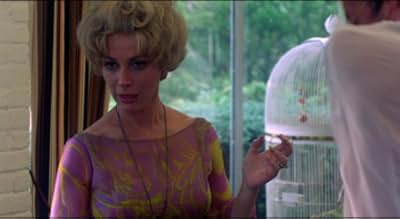Our hero here is Elgar Winthrop Julius Enders (Beau Bridges), age 29, a White, rich, and very naïve man who, much to the disgust of his hateful bourgeoisie family, cheerily buys a rundown urban tenement building, filled with Black, poor, and very sophisticated adults and street-wise kids. Elgar thus sets himself up to be caught in the middle of an inevitable culture clash.
Director Hal Ashby creates a cinematic social commentary suited to the late 1960s and early 70s that is both comedic and thoughtful. Elgar's tenement dwellers wrestle with serious issues, like how to pay the rent. Elgar's snobbish mother worries about what Elgar wears to an elitist banquet. The plot doesn't "flow" in a traditional way; instead, it feels "jerky"; long scenes are followed by very short scenes, followed again by long scenes, and so on.
This change in rhythm, brought about by cross-cutting, amplifies ironic contrasts between these two social classes. The resulting editing is satisfying in that the comedy takes the edge off of the anger attendant to the more serious subtext. This film style works well until the final twenty minutes when the plot becomes too heavy handed and alarming. The bow and arrow scene in the middle is okay, but the fearful ax scene toward the end, sans humor, is not okay because it disrupts tonal balance.
Ashby also wanted the cinematography to be darker in the tenement scenes than in Elgar's aristocratic family segments. The result is cinematography so dark in ghetto interior scenes I could sometimes not distinguish people from furniture.
Casting and acting are quite acceptable. The standout performance is Diana Sands as Fanny, "Miss Sepia of 1957". And then there's wonderful Pearl Baily; I never realized she had been that young looking.
Social commentary films do not usually age well. And "The Landlord" certainly shows its age. I kept expecting a Simon and Garfunkel song at almost any moment.
Overall, this film is an enjoyable throwback to a bygone era of hippies, social consciousness and the generation gap. It has its flaws, but hippie Ashby gets his message across effectively, owing to an adroit mix of seriousness and humor.


































